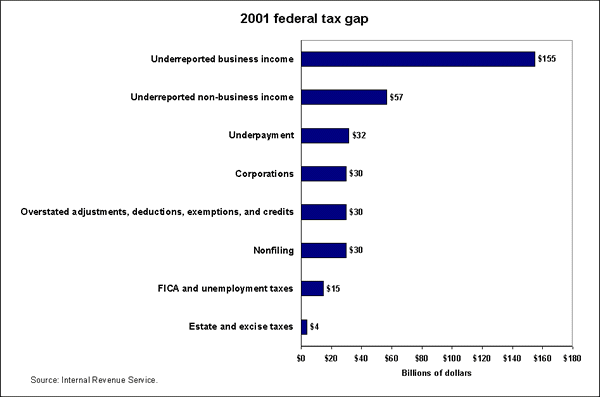See Snapshots Archive.
Snapshot for April 13, 2005.
Government loses when taxes go unpaid
The latest research from the Internal Revenue Service puts the amount of taxes owed but not paid “voluntarily and timely”–also known as the “tax gap”–at $353 billion, or about 15% of total taxes owed. The U.S. tax system depends in great part on voluntary compliance. The extent of such compliance in the United States compares well with other countries, but this asset is in danger of being squandered by inadequate tax enforcement. Failure to enforce the law encourages greater evasion, and increased evasion puts a greater burden on enforcement, contributing to a vicious circle that increases the tax gap.
Components of the gap are shown in the figure below. The bulk of underreporting is in the individual income tax owed by business firms and the self-employed, leading to $155 billion in unpaid income tax in 2001. Next is $57 billion in revenue lost due to underreported non-business income. A tax liability of $32 billion was reported by taxpayers but not paid, while corporations underreported to the tune of $30 billion in unpaid corporate income tax. An estimated $30 billion shortfall is attributed to taxpayers failing to file, and another $30 billion in lost revenues is due to overstated adjustments to income, deductions, exemptions, and credits. This latter category includes about $9 billion in over-claims for the Earned Income Tax Credit, which gets a disproportionate share of political attention. A lesser component of the gap–$15 billion–is unpaid payroll taxes. The remainder is unpaid estate and excise taxes of $4 billion.

The amount lost due to complex international transactions engaged in by corporations and wealthy individuals is unclear and could be much greater than IRS estimates suggest. The Tax Justice Network (a coalition of researchers and advocates that campaigns on behalf of better enforcement of tax law by governments) gauges the extent of wealth outside the view of tax authorities at over $11 trillion.
U.S. funding for tax enforcement has severely lagged the growth in the economy, in tax returns, in the complexity of tax law, and in new regulatory burdens placed upon the Internal Revenue Service. This week, the New York Times reported that budget cuts could force the closure of IRS walk-in tax assistance centers, even though Commissioner Mark Everson of the IRS and Senator Christopher Bond (R-MO) have noted that taxpayer assistance generates net revenue. In the international arena as well, the Bush Administration has been reluctant to expand cooperation with foreign governments required to curb growing tax evasion. This type of failure to crack down on tax evasion deprives the U.S. government of billions of dollars in much-needed tax revenue.
This week’s Snapshot was written by EPI economist Max B. Sawicky.
